 Oops. Just realized that my standard "this is what's on the month's Supporting Actress menu" post got forgotten this week. So, I s'pose now's as good a time as any...
Oops. Just realized that my standard "this is what's on the month's Supporting Actress menu" post got forgotten this week. So, I s'pose now's as good a time as any... See, 1950 brings a nice assortment of actressexual delights, with a little actressing at the edges for everyone. There's dramatic work from a villainous monster, a formidable ingenue, a wry observer and a salt-of-the-earth wiseacre, as well as delirious comedy turn in the form of a twitterpated flibbertigibbit played by...
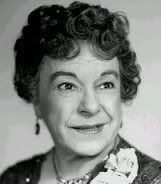
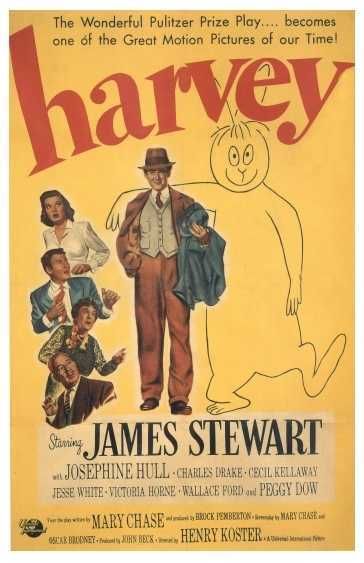
...Josephine Hull in Harvey(1950).
approximately 37 minutes and 13 seconds
15 scenes
roughly 36% of film's total running time
Harvey - based on Mary Chase's pulitzer prize winning hit play - tells the story of Elwood Dowd (played here by a glib James Stewart) and his best friend, a six-foot+ white rabbit named "Harvey." Elwood does little but hang out with Harvey, chatting with him idly as they both pursue their favorite vocation - drinking in bars around town, where Elwood orders two martinis at a time, one for him and one for Harvey.
 20:07 - ELWOOD (to Harvey): "Hmmm... Random House... No.... Deluxe edition..."
20:07 - ELWOOD (to Harvey): "Hmmm... Random House... No.... Deluxe edition..."The script wrings much in the way of situational comedy from the farcical misapprehensions of Elwood's conversations with Harvey, especially when Elwood's taken to a local sanatorium for treatment by his anxious sister Veta Louise (Hull).
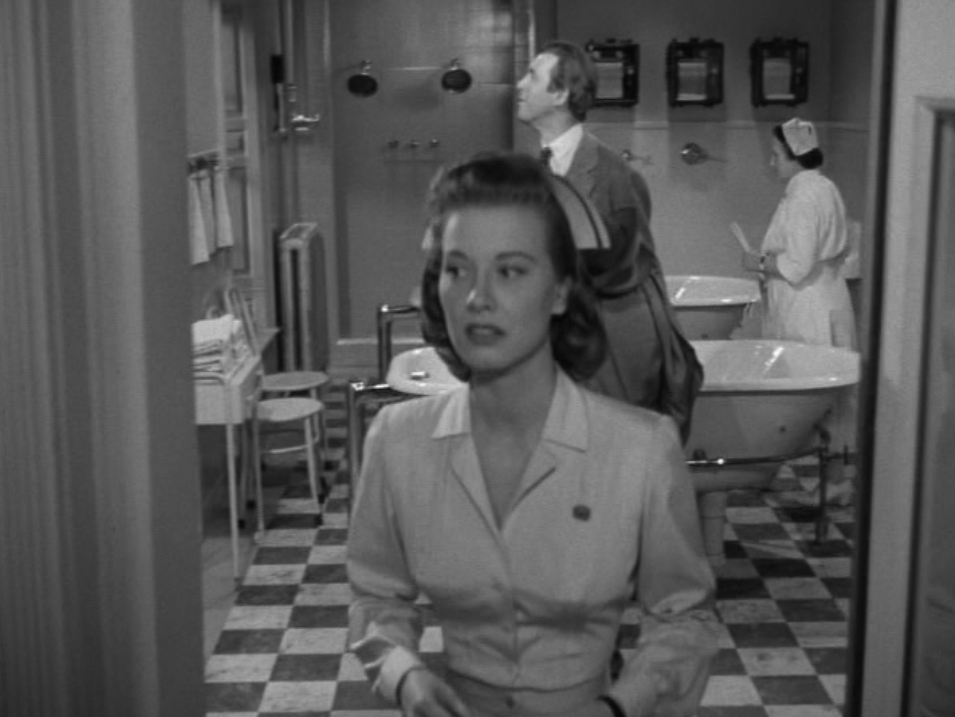 @1950 seconds - ELWOOD (to Harvey): You could've had a bath, too.
@1950 seconds - ELWOOD (to Harvey): You could've had a bath, too.Putting aside the details of the play's obliquely queer allegory (Elwood's an unmarried bachelor, witty and charming and fascinated by everyone he meets, a devoted mama's boy and a good dancer, whose male companion inspires shock and horror among most to whom he is introduced, except of course for those who also hang out in those shady bars downtown, and whose relationship with this male companion leads his family to institutionalize him for drastic psychiatric intervention), the narrative follows a fairly simple arc: will Elwood's family "accept" and "tolerate" Elwood as he is? Or will they -- through water-cures, psychoanalysis & psychotropic drugs -- force him to become "normal"? And, at the center of it all, stands Josephine Hull's Veta Louise -- Elwood's devoted but socially conventional & easily over-stimulated sister.
 Josephine Hull was a veteran stage actress before she was "discovered" by film audiences in the screen adaptations of Arsenic and Old Lace (1944, opposite Cary Grant) and Harvey (1950, opposite James Stewart). In these roles (both of which Hull originated on stage), Hull played a sweet but somewhat dithering old biddy, single-mindedly committed to doing what she thinks is right. Both roles, too, provided a showcase for Hull's a wild repertoire of funny faces, silly takes, tippling vocals, and goofily proper postures, as well as her verbal dexterity with the loquacious stage-comedy writing of the period. To be sure, the character of Veta Louise is generally well served by Hull's arsenal of character actress tricks/tics. (Click any pic above to enlarge.) Hull takes Veta Louise's thoughtless conventionality and layers it with farcical idiosyncracy to create a seriously dingbatty character. (It's Alice Ghostley and Gladys Cooper all at once, no mean feat.) Further, for the most part, Hull maintains Veta Louise's utter seriousness even amidst the narrative's alternately absurd and giddy shenanigans. Hull has a ball with Veta Louise's anxious investment in social niceties, especially Hull's terror not only that her awkward daughter might remained unbetrothed due to Elwood's odd behavior but also that she and her daughter are both financially dependent on her possibly insane baby brother.
Josephine Hull was a veteran stage actress before she was "discovered" by film audiences in the screen adaptations of Arsenic and Old Lace (1944, opposite Cary Grant) and Harvey (1950, opposite James Stewart). In these roles (both of which Hull originated on stage), Hull played a sweet but somewhat dithering old biddy, single-mindedly committed to doing what she thinks is right. Both roles, too, provided a showcase for Hull's a wild repertoire of funny faces, silly takes, tippling vocals, and goofily proper postures, as well as her verbal dexterity with the loquacious stage-comedy writing of the period. To be sure, the character of Veta Louise is generally well served by Hull's arsenal of character actress tricks/tics. (Click any pic above to enlarge.) Hull takes Veta Louise's thoughtless conventionality and layers it with farcical idiosyncracy to create a seriously dingbatty character. (It's Alice Ghostley and Gladys Cooper all at once, no mean feat.) Further, for the most part, Hull maintains Veta Louise's utter seriousness even amidst the narrative's alternately absurd and giddy shenanigans. Hull has a ball with Veta Louise's anxious investment in social niceties, especially Hull's terror not only that her awkward daughter might remained unbetrothed due to Elwood's odd behavior but also that she and her daughter are both financially dependent on her possibly insane baby brother.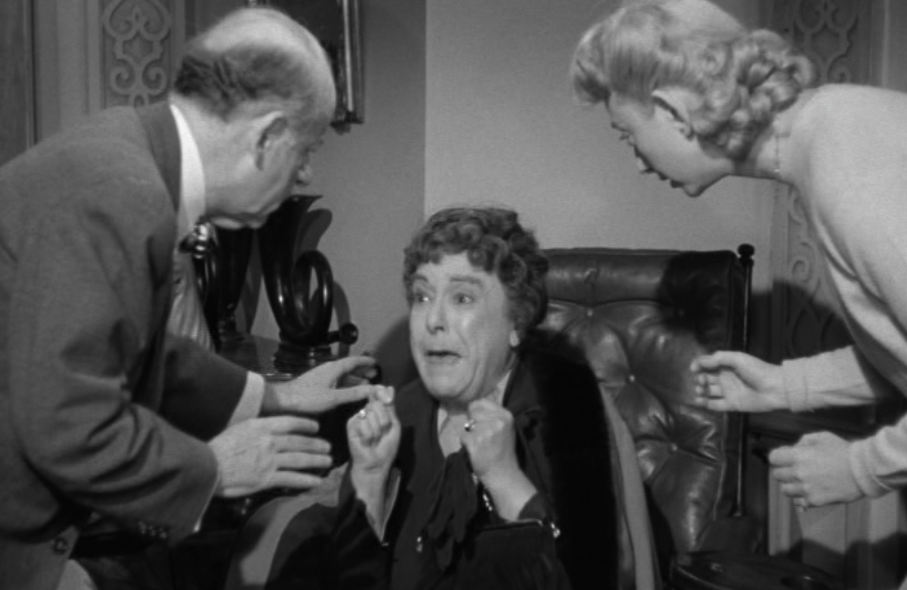 As Veta Louise, Hull is just dear. And she's occasionally genuinely funny. (StinkyLulu did love
As Veta Louise, Hull is just dear. And she's occasionally genuinely funny. (StinkyLulu did love 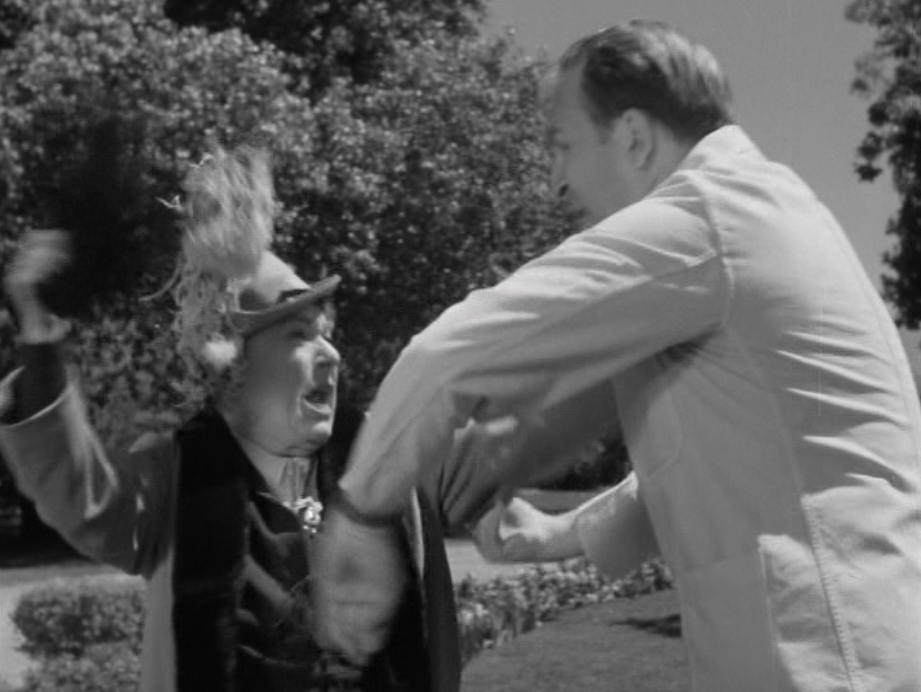 Hull's righteous misunderstanding of the motives behind the asylum's attempts to institutionalize her - "White slavers!"
Hull's righteous misunderstanding of the motives behind the asylum's attempts to institutionalize her - "White slavers!"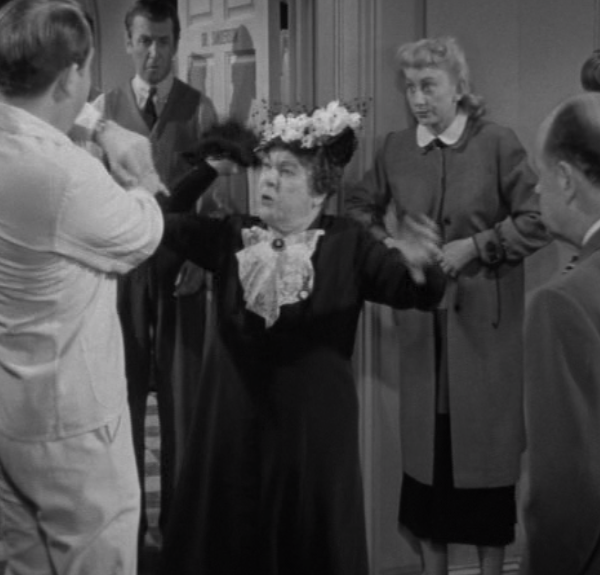 - as well as her phyisical attacks on her future son-in-law.) But, while deft, Hull's Veta Louise emerges as a fairly simple and fairly foolish performance. Indeed, despite the fact that the role of Veta Louise does provide a winning showcase for Hull's especial gifts, Stinkylulu yet wonders if the role might have been better served by a slightly younger actress in the part... Justa thought.
- as well as her phyisical attacks on her future son-in-law.) But, while deft, Hull's Veta Louise emerges as a fairly simple and fairly foolish performance. Indeed, despite the fact that the role of Veta Louise does provide a winning showcase for Hull's especial gifts, Stinkylulu yet wonders if the role might have been better served by a slightly younger actress in the part... Justa thought.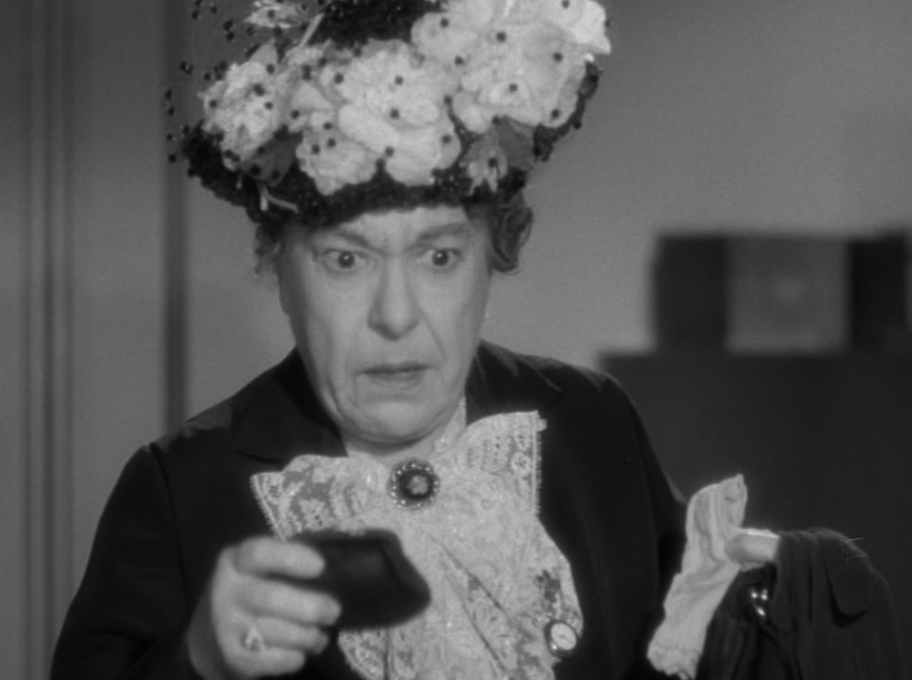 So, at the end of the day, StinkyLulu loves Josephine Hull. But not this performance...
So, at the end of the day, StinkyLulu loves Josephine Hull. But not this performance...

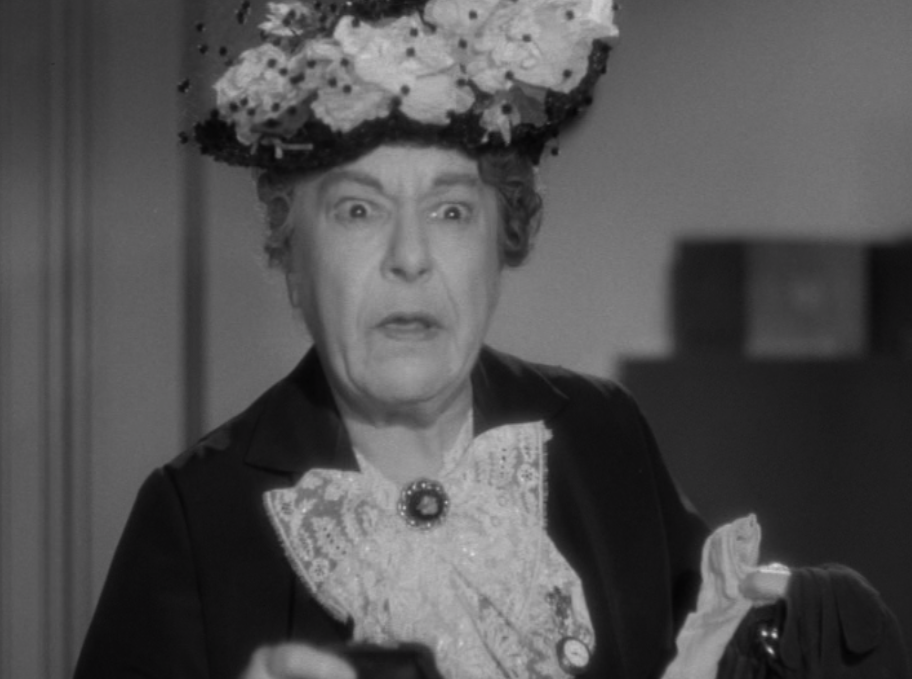
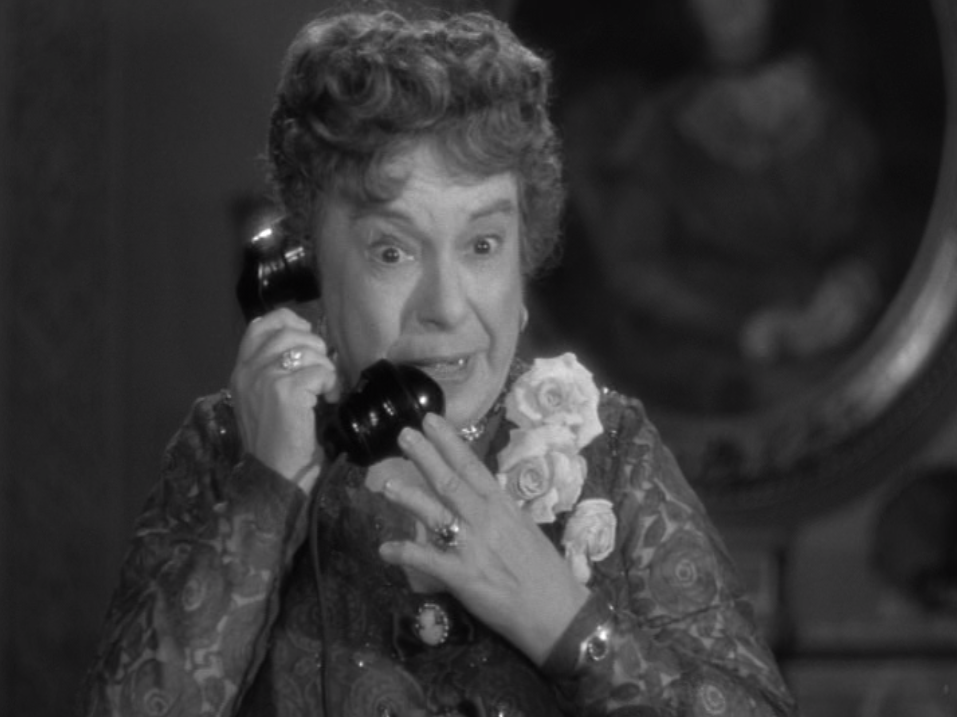


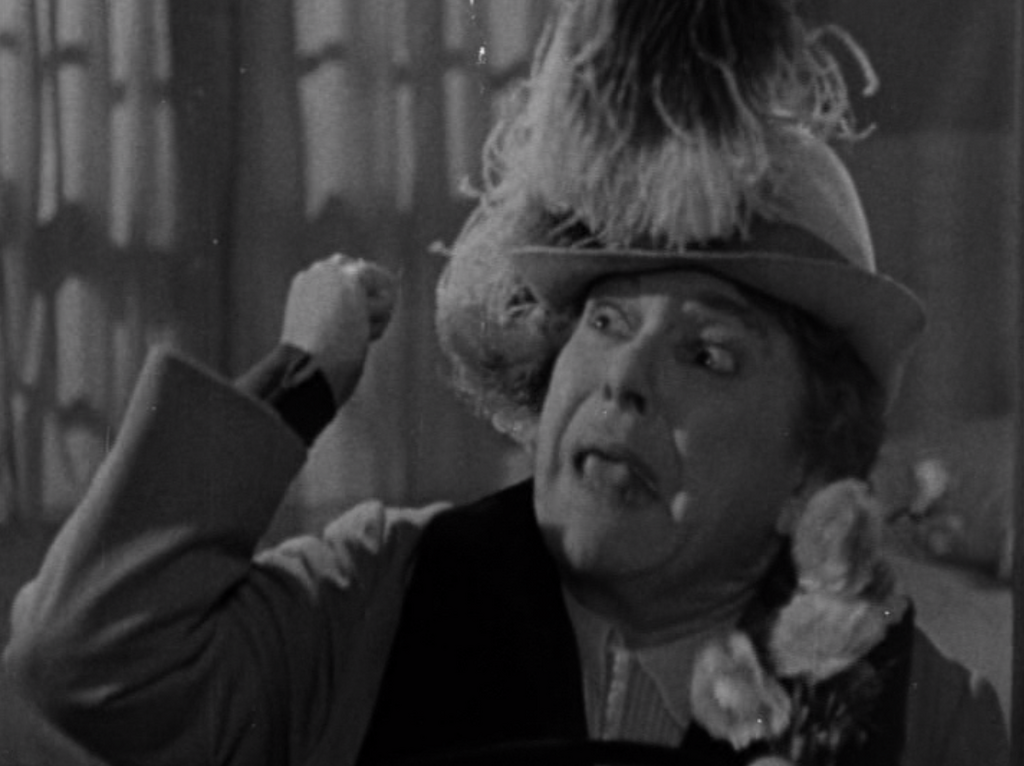
9 comments:
I think Hull suffers from the vacuity of her role. She is funny, or her character is, but eventually the result is none other than a sketch of a desperate woman. Love her scenes in the looney bin, but an Oscar for this? Nay.
Her character seems designed to be more of a "requirement" rather than a "contribution" to the world of the film.
Oh, and wow, this entry came early. I usually wake up to them in the morning. :)
Whoah, Hull looks like Rip Torn in that last screen shot. @_@
JS - At first I didn't see Rip Torn at all. Now I can only see Rip Torn in flowery hat.
I always thought this was a terrificly funny, one-note role (and I love Hull to smithereens). However, there was only one Best Supporting Actress in 1950, and that was Celeste Holm-can't wait for the review on her!!!
How did this mess ever win the Pulitzer? That is the real question. I like Hull okay in the part. Imagine Alice Brady, though... H
hull adds to the queer allegory by looking decidedly like a really old drag queen.
Indeed, crunky tor.
Very well put.
Crunky, the estate of George Sanders called to inform you they will not forfeit Sanders' 1950 Best Supporting Actor statutte to Hull for his or her performance in Harvey.
Good thing you weren't around to shake things up in 1950.
Post a Comment